Is the Government rebalancing the economy?
"Yes, there are deep-seated challenges in the north-east, but I am confident that progress is being made in rebalancing the economy, and that is down to the strength of the private sector."
Mark Hoban, Work and Pensions Minister, 12 March 2013
It's a phrase you'll hear time and time again from politicians: "we need to rebalance the economy". Obviously, economies can be 'unbalanced' in any number of ways. Yesterday the employment minister Mark Hoban suggested that, as far as jobs were concerned, progress was being made to bring the north back up to speed with the south.
Let's start with the same focus that Employment Minister uses: jobs. To examine the regional employment divide, it's worth going a little further back in history for some context.
Join 72,953 people who trust us to check the facts
Sign up to get weekly updates on politics, immigration, health and more.
Subscribe to weekly email newsletters from Full Fact for updates on politics, immigration, health and more. Our fact checks are free to read but not to produce, so you will also get occasional emails about fundraising and other ways you can help. You can unsubscribe at any time. For more information about how we use your data see our Privacy Policy.
In 1997...
When Tony Blair's Labour Government came to power in May 1997, the regional divide was stark - 62% of working-age people in the South East were in employment, compared to 53% of working-age people in the North East:
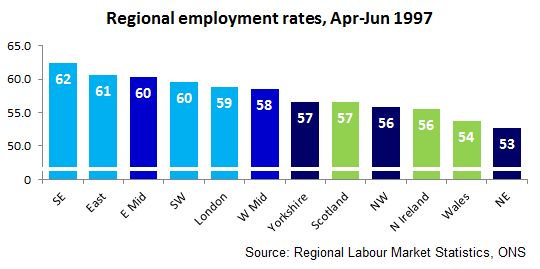
In 2010...
By the end of Labour's time in office, the divide had closed slightly: the employment rate was 61% in the South East and 54% in Wales and the North East. Here's how things stood as the Coalition entered office:
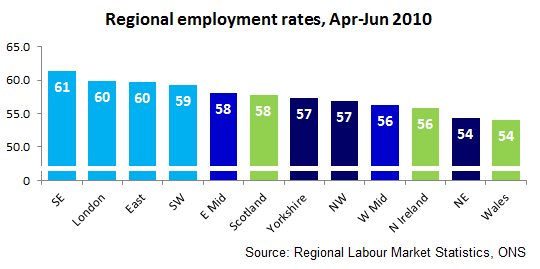
Now...
Since the 2010 election, the divide has crept up marginally, but the difference isn't significant: 62% of working-age Londoners are in work compared to 55% in Wales and the North East. In essense, the broad divide remains doggedly unchanged, even since 1997.
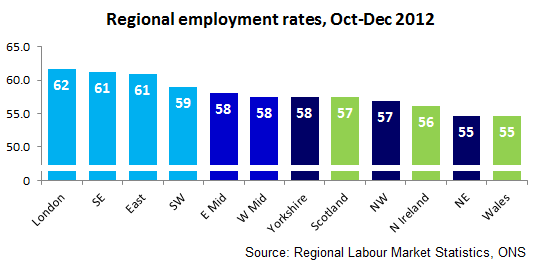
So the labour market is still relatively unbalanced, and we're broadly where we were in 2010. Not much of a story there...
Where does the private sector come in?
There are, as the Government will be keen to point out, an extra 750,000 people in employment overall since the election - a combination of private sector growth and public sector shrinkage. Across the entire economy, the proportion of people employed in the private sector has risen from 78% in 2010 to 81% now.
The growth of the private sector relative to the public sector is fairly uniform across every region, and there's no discernible boon to the north relative to the south:
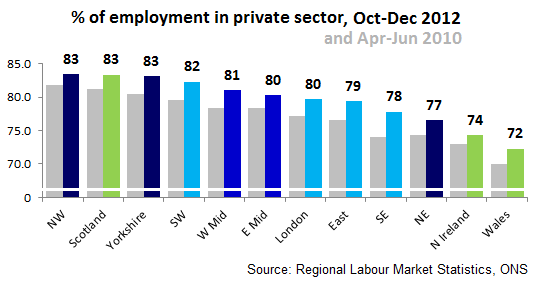
Not much of a story there...
What about the wider economy?
The fact that unemployment is falling in the UK and yet economic growth is sluggish suggests a look at the labour market alone might not give us the whole picture.
We can examine growth across the UK's regions using a measure called 'Gross Value Added' (GVA) which measures the value of goods produced in a specific UK area. The Office for National Statistics measure this in their regional GVA series.
Obviously, the UK economy has grown since 1997, as has every region in isolation. But looking at the regions' share of the total UK economy, only the southern regions have seen their slice of the pie increase. Everywhere else has shrunk or stayed the same relative to the whole economy:
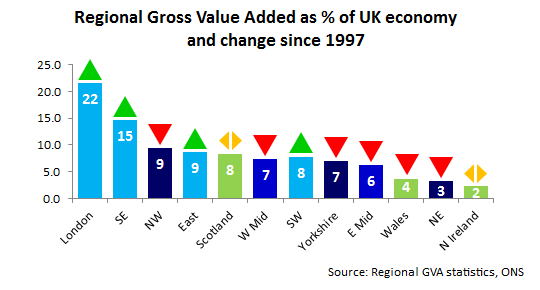
The same changes since 2010 are negligible, so it's too early to tell whether the current Government are overseeing a reversal of the north's fortunes since the turn of the century.
In any case, the trends that are discernible since the 2010 election suggest that, broadly speaking, nothing much has changed. If anything, there have been slight increases in 'regional inequality' when it comes to jobs since the election, but this isn't enough evidence to say there's a widening trend.